Displaying items by tag: Race Officers
Olympic Sailor Offers Ten Top Tips for Race Officers
Olympic helmsman Mark Mansfield, who is now a sailing coach, provides some sailor-focused thoughts for Race Officers
Over the past few years, I have been competing in various sailing events throughout Ireland, the UK, Europe and the USA. Very often it is the same issues that repeatedly come up which the sailors are not happy with. Invariably, it is either race course set up or the conduct of the race management or both.
Race Officers roles are primarily linked to on-the-water race management. They are responsible for laying the course and starting and finishing the races. The most experienced become International Race Officials recognised by the International Sailing Federation.
Here in Ireland, we are blessed with having some excellent Race Officers who not only officiate in events in this country but also further afield, all the way up to the Olympic Games. Some others, however, are still learning their trade and this can lead to frustration with the sailors so here are some tips for Race officers from a competitors perspective.
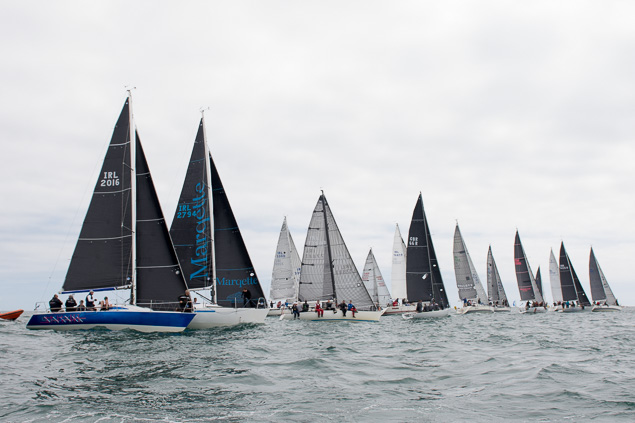 A Class Two Start in Cork Photo: Bob Bateman
A Class Two Start in Cork Photo: Bob Bateman
Tip 1. The Waiting Game
The biggest complaint from sailors is always waiting around between races to get the next start going. Often when there are three or four classes on the same course area, there can be an hour between the first class finishing and the final competitors for the last class to finish. This is very frustrating. At an event I did this year, the J Cup in Hamble, the race officer used a separate finishing boat (a rib) to record the finishers. The start line was always positioned behind the leeward gate with the start buoy always in place and ready for a new start. At the end of each class's last leg, the fleet went around the left-hand gate (facing downwind) which was positioned to the left of the startline and reached to the finish. Once that class was finished they were told to get to the start and a new race sequence would start again in 10 minutes. There were six classes on the one racecourse and three races were completed in record time. Each day. classes were starting again while other classes were still coming down the last run.
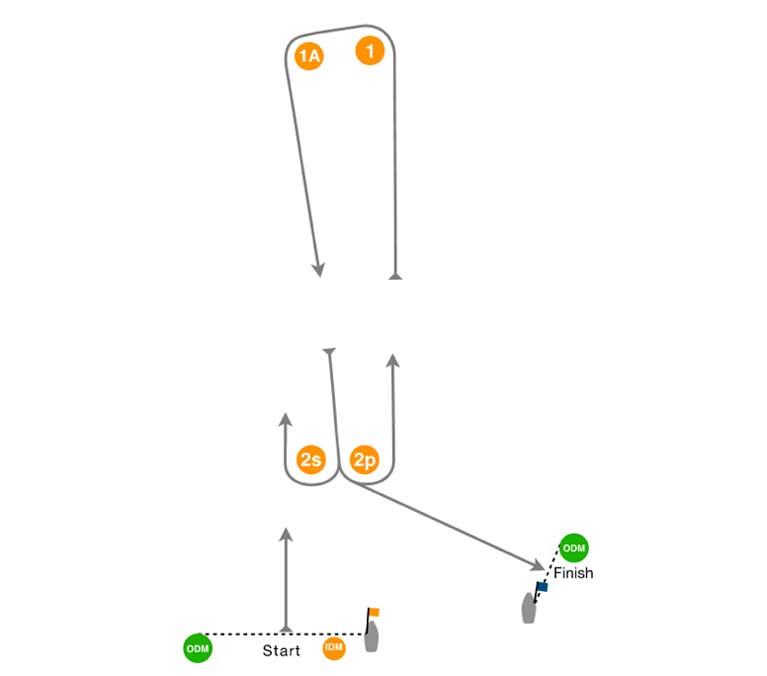 The course used at the 2019 J Cup
The course used at the 2019 J Cup
Tip 2. Pick Your Time
Start the racing early (or late) if possible. Though not always a race officers decision, if only one or even two races are being sailed, try and not use up the whole day with sailing. Boats are finding it harder and harder to get crew, and sailors often have family or other commitments at weekends. Races starting at 12 midday, as often they are, involve realistically a full day in order to maybe just do two races, each lasting one hour. Were racing in these cases to start at 10.30 and if the time between was kept to a minimum, then the sailing could be finished by 13.00, leaving an afternoon free. Likewise, as they do with DBSC racing, starting at 14.00 or 14.30, leaves the whole morning available for other matters.
Tip 3. VHF Banter
Keep the chat over the VHF to a minimum during the race sequences. Often you hear Race officers over the VHF “coaching” competitors that they are too close to the line, and sometimes even telling boats that they are over, even before the start. I can understand this is local league racing, but in recent years it is sometimes also happening in bigger events. Starting is part of the sport and working out whether you get to the line early or late is a tactical choice.
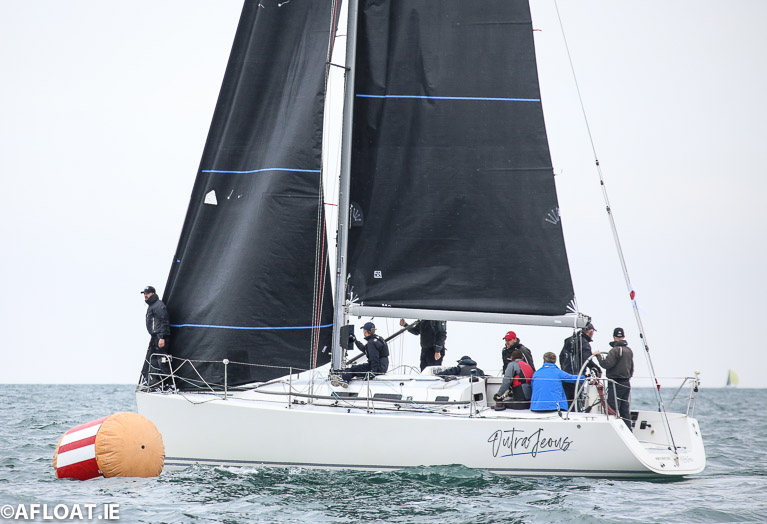 The J109 Outrajeous 'pings' the line with its race computer prior to a start Photo: Afloat
The J109 Outrajeous 'pings' the line with its race computer prior to a start Photo: Afloat
Tip 4. 'Ping' the Line
Nowadays most competitive boats are using startline GPS aids like Racegeek or Velocitek pro starts. These require the boats to 'ping' both ends of the line. If a race officer decides to move either the Committee boat or the pin, they should allow 5 minutes or so before going into a sequence, as many boats will need to ping the line again. This came to a head at Scottish series this year when an Irish boat was disqualified for being around the start line as another class was in sequence. The reason for this was the pin was moved late, and then the Race officer went straight into a start sequence so many boats needed to re ping. Later in the regatta boats were in the same position needing to re ping, and were not disqualified.
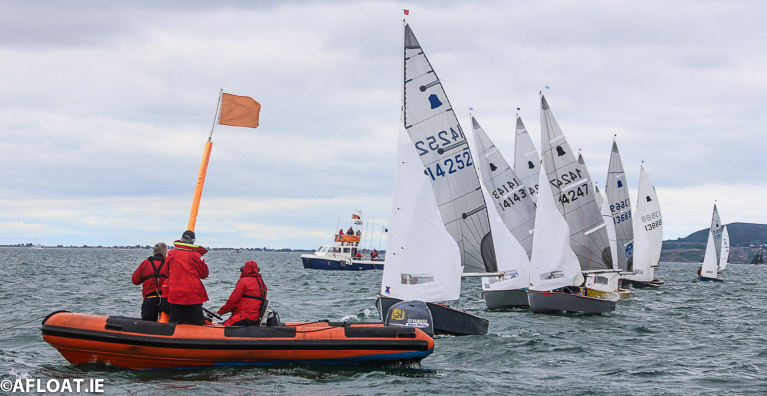 A GP14 dinghy start at Volvo Dun Laoghaire Regatta Photo: Afloat
A GP14 dinghy start at Volvo Dun Laoghaire Regatta Photo: Afloat
Tip 5. Perfection Not Required
Often, a lot of time seems to be wasted by some race officers trying to get the perfect line and perfect first beat. Sometimes it is better to not be perfect and just get the race away. If it comes to pass, in 10 minutes or so of the race, that it was unfair, abandon it, and go again.
Tip 6. Reaching Start is Toss of a Coin
Avoid reaching starts if at all possible on inshore races. This is particularly so if the start line is near a shore and part of the line is affected by possibly less wind. In a big event, this type of start can determine a whole series. Often these starts are a toss of a coin as to which area of the line is best to start. At one regatta this year, a reaching start happened for various reasons in two races. The pin was closer to the first mark but in a bit of a lee from the shore. In these races, within a five minute period, competitors in one class got hammered for starting near the Pin. Then five minutes later, the pin was by far the place to start for the next class. It all depended if a gust came down to that part of the line or not. There's just too much luck involved with reaching starts.
Tip 7. Keep Competitors Up to Date
Before the race keep the fleet informed over the VHF if there are delays due to a lack of wind, huge shifts or other matters. Some Race officers in Ireland are very good at this, others less so.
Tip 8. Big & Small Boats
If at all possible, try not to start two different classes together in the same start in important regattas. A big boat with big sails can ruin a smaller boats start in the same race. All very well if they are in the same class, but if the bigger boat is in the class ahead, then a regatta can be decided by whether another big class boat comes over the top of you at a start and kills your ability to get away clean from the line. This is possibly more a race organisers decision, but race officers can be involved also in making these decisions.
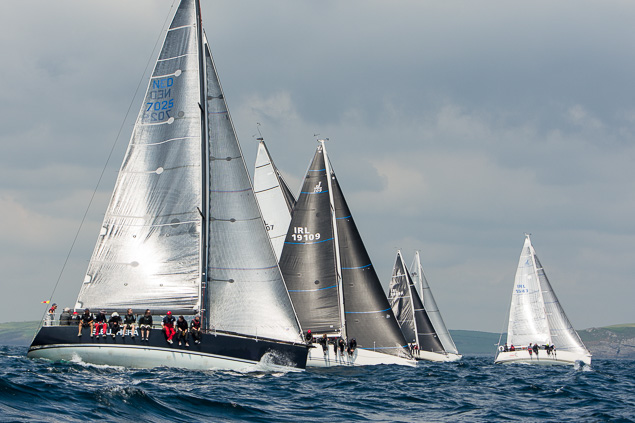 Class One yachts competing at the Sovereign's Cup Photo: Bob Bateman
Class One yachts competing at the Sovereign's Cup Photo: Bob Bateman
Tip 9. Vary Courses
In a mixed fleet, race officers should try to vary the courses as much as the sailing instructions will allow. In IRC racing, asymmetric spinnaker boats like reaching, whereas the symmetrical boats generally like the windward/Leeward courses. A race officer determining to use all windward/leeward courses is effectively giving an advantage to the symmetrical boats. A mix of courses is better, if possible.
Tip 10. Shorten When Needed
Race officers need to be more proactive in shortening races to prevent, on occasions, half the fleet not making a finish in time and end up being scored DNF. This has happened a few times recently in Irish events and can be very frustrating for those that do not make the finish. Time out might be ok for tail-enders but certainly not ok if, say, only the top half of a fleet finish. When there is a dying breeze, the Race Officer should be on high alert to running out of time as competitors must finish within 30 minutes of each other. Options include shortening the leg of the course or finishing at the end of the previous leg.
Fair sailing.

























































